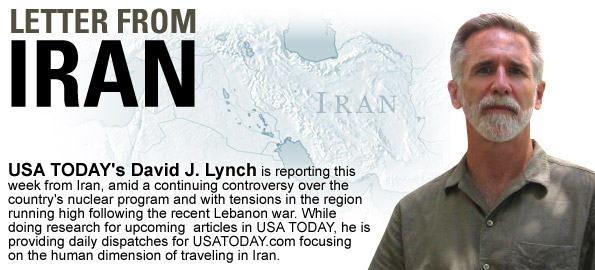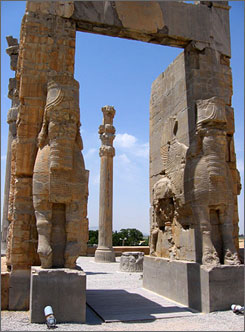
Day 5: A mullah takes the long view at Persepolis
I finally met a mullah. No trip to Iran would be complete without a mullah
meeting. And today I had one.
His name was Mahdi Atashkar and he was touring
the ruins of Persepolis, capital of the ancient Persian Empire.
In 518 B.C., the Persian King Darius built himself a network of palaces
designed to awe subjects from every corner of an empire that ran from India to
Ethiopia. The walls were flecked with gold and turquoise. The surviving carvings
on the limestone blocks are so detailed, you can read the expressions on the
faces of courtiers and tell a Phoenician from a Cappadocian. It's honestly hard
to do the place justice with mere words.


Atashkar, sporting a white turban and a thick, black upswept beard,
pronounced himself impressed, but offered the sort of long-range perspective
you'd expect from a man of God. "Where are those that built these places? Where
are they now?" he asked. "Despite the beauty of the architecture, none of them
exist anymore. They left this world with empty hands."
They weren't the only ones. The former Shah liked Persepolis so much that in
1971 he staged an absurdly lavish celebration here. He invited kings and queens
from all over the world, housed them in luxurious tents at the base of the ruins
and flew in their food daily from Maxim's of Paris.
The Shah figured his subjects, most of whom had a better chance of seeing the
moon than visiting Paris, would get a kick out of how important he was. Instead,
they fumed at the extravagance and began plotting his demise. He was gone by
1979 and dead a little more than a year later.
Standing at Persepolis, I had the same feeling I always get when I'm seeing
one of the ancient world's treasures. The people who lived long before us once
were just as proud of their accomplishments, just as certain they had life all
figured out, as some of us are today. The 10,000 bodyguards who ringed Darius
wherever he went were known as "The Immortals."
In the end, they proved pretty mortal. The Persian Empire's day of reckoning,
like the Shah's, inevitably arrived. Alexander the Great swept in from Macedonia
in 330 B.C., burned anything flammable and wrecked or looted whatever wouldn't
burn.
By now, the young mullah and I had been talking for awhile about the
controversy over Iran's nuclear program, Islam and Christianity, you name it.
About a dozen of his students, all girls, all wearing black chadors, stood
nearby, gawking and giggling like teenagers anywhere.
As I prepared to leave, Atashkar said he had one more thing to say. "I want
you to inform the American people," he said, "¡that there is no difference
between a true Muslim and a true Christian."
We all face that day of reckoning.